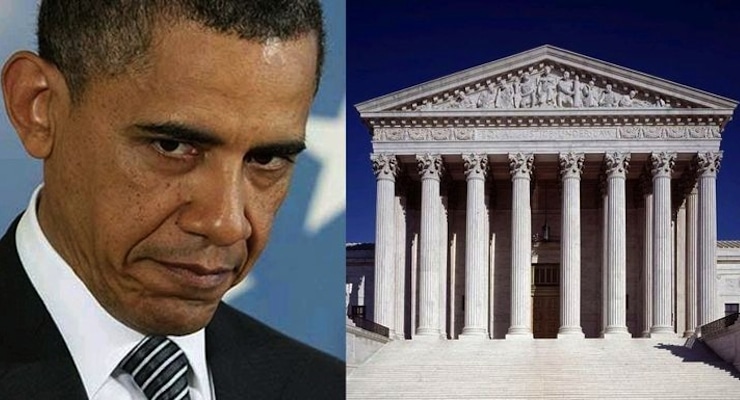

President Barack Obama, left, and the U.S. Supreme Court (SCOTUS), right. (Photos: AP/Getty)
The Supreme Court said it will hear President Barack Obama’s executive amnesty after an appeals court last November made permanent an injunction by a lower district court. The Fifth Circuit Court of Appeals in New Orleans ruled last year against Obama and upheld a Texas judge’s injunction against the expansion of the Deferred Action for Childhood Arrivals program, which shields young illegal immigrants from deportation if their parents brought them to the U.S. as children.
The appeals court ruling put the administration’s record on executive amnesty at 0-5 in the courts and was thought to reduce the prospect of implementation of the executive order before Obama leaves office in 2017. Depending on how the case is ruled upon, the injunction could even get kicked back to the Texas federal court, though that is highly unlikely.
The 70-page majority opinion by Judge Jerry Smith, which was joined by Jennifer Walker Elrod, rejected the Obama administration’s arguments that the district judge abused his discretion with a nationwide order, as well as their argument that the states lacked standing to challenge Obama’s executive orders. In fact, while the court majority acknowledged the argument that an adverse ruling would discourage potential beneficiaries of the plan from cooperating with law enforcement authorities or paying taxes, the court held that the president did not have the authority to issue the order and did indeed place an unduly burden on the states.
Texas Gov. Greg Abbott, who began the 26-state lawsuit as the state attorney general, called it a “vindication for the rule of law and the Constitution.” The Justice Department, which asked the high court to hear the lawsuit shortly after the November ruling, argued that the president has prosecutorial discretion. However, this executive power has always been understood to be constitutional only on a case-by-case basis, not with such a wide application.
Prior to the ruling, and despite assurances by top administration officials to the contrary, the United States Citizenship and Immigration Services began reallocating significant resources away from a computer system — known as the “Electronic Immigration System” — in order to send letters to all 9,000,000 green card holders urging them to naturalize prior to the 2016 election.
The development puts the issue at the forefront ahead of the 2016 presidential election, something the president’s party was hoping to avoid. While the case is expected to be heard in April, the decision would come down likely sometime in June, just three weeks before the Republican National Convention.
A newly obtained document (viewable on a previous article) written by Leon Rodriguez, the “director and co-chair of the Task Force on New Americans,” details an “integration plan that will advance our nation’s global competitiveness and ensure that the people who live in this country can fully participate in their communities.”
Executive amnesty has also been losing in the court of public opinion, as well. As PPD has previously examined, particularly in the case of immigration, the results get worse when the question is asked more plainly. We have examined and explained the data on this topic in great detail in the past, but most voters still oppose President Obama’s executive order to exempt millions of illegal immigrants from deportation. A solid 59% say Obama does not have that legal power to issue the order, which is up from 52% in February and a new high to date.
Further, only 35% favor the president’s actions, which is little changed from 5 months ago, and only 25% believe the president has the legal authority to grant executive amnesty without the approval of Congress. A nearly identical number of voters (26%) say Obama should take action if Congress doesn’t lay down in front of him on the issue.
The states suing Obama over his unilateral amnesty order now includes Alabama, Arizona, Arkansas, Florida, Georgia, Idaho, Indiana, Kansas, Louisiana, Maine, Michigan, Mississippi, Montana, Nebraska, North Carolina, South Carolina, North Dakota, Ohio, Oklahoma, South Dakota, Texas, Utah, West Virginia and Wisconsin.







